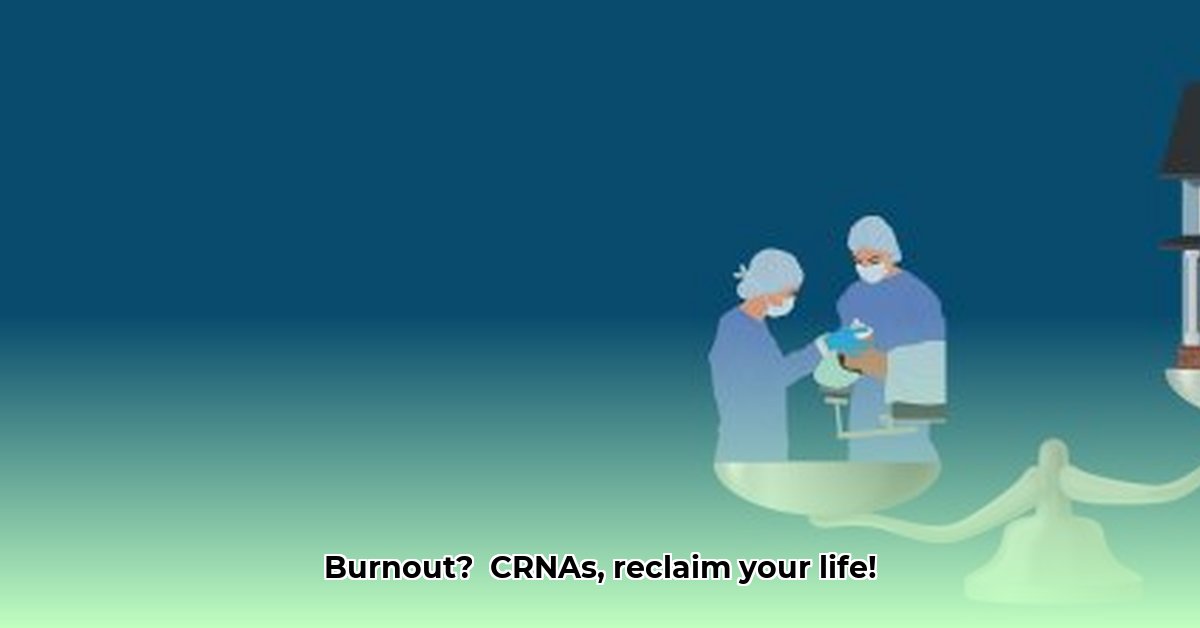Being a CRNA is incredibly rewarding, but the long hours, pressure, and emotional demands can leave you feeling completely drained. It’s easy to lose sight of life outside of work, so this guide offers practical steps to reclaim your time and energy. We’ll explore challenges CRNAs face in balancing professional and personal lives, providing step-by-step strategies for a healthier lifestyle. This guide discusses real-world solutions, from individual strategies to systemic changes within healthcare. You deserve a fulfilling life, both inside and outside the hospital, and this guide will help you make it happen. For more time management tips, check out this helpful guide on work-life balance.
Understanding CRNA Challenges and Maintaining Work-Life Integration
The life of a Certified Registered Nurse Anesthetist (CRNA) is undeniably demanding with long days and disruptive on-call shifts. It can be tough to sustain relationships or even have a consistent sleep schedule. Balancing a very demanding career shouldn’t come at the expense of your overall well-being. It requires significant commitment, but it shouldn’t cost your health. How can CRNAs manage the inherent stresses of a high-stakes medical profession?
Common Challenges for CRNAs Beyond Long Work Hours
The challenges faced by CRNAs extend far beyond long hours and on-call duties. The emotional toll of witnessing patient suffering and making life-altering decisions under pressure can significantly affect CRNAs. Many CRNAs find that the irregularity of their schedules makes it difficult to maintain healthy routines. What systemic changes can be made to address optimal staffing ratios and administrative pressures on CRNA workloads? The cumulative effects of these factors can lead to burnout, impacting both professional performance and personal life, potentially leading to decreased job satisfaction and an increased risk of medical errors. Furthermore, financial pressures, such as student loan debt, can drive CRNAs to take on extra shifts, exacerbating the imbalance. The need to stay current with the latest medical advancements requires continuous learning, adding to the time constraints.
Short-Term Strategies: Immediate Improvements for CRNAs
These strategies offer immediate relief and are designed to be implemented quickly. Small changes can significantly improve your well-being. Aim to incorporate quality sleep, regular exercise, healthy meals, and mindfulness practices like meditation to reduce stress and improve overall focus. Prioritize sleep by aiming for 7-8 hours each night, as sleep deprivation can negatively affect mental and physical health.
- Prioritize Self-Care: Prioritize self-care habits, such as sleep, exercise, and nutrition, for fundamental well-being. Sleep deprivation can negatively affect mental and physical health. Even 15-20 minutes of dedicated self-care can make a noticeable difference.
- Master Your Schedule: Allocate specific time slots for work and personal activities using time-blocking techniques. Prioritize tasks based on their importance and urgency. Consider using scheduling apps or a digital calendar to help you stay organized.
- Establish Boundaries: Create a clear separation between work and personal life by avoiding checking emails or messages after hours unless necessary. Inform colleagues and supervisors of your availability during off-hours.
- Explore Flexibility: Speak with your employer about the possibility of compressed workweeks or part-time options for improved work-life balance. Be prepared to present a well-reasoned case for how this would benefit both you and the organization.
- Delegate Tasks: At home, delegate chores to family members or consider hiring help for tasks like cleaning or lawn care, if your budget allows. This frees up your time and reduces your workload.
Long-Term Strategies: Creating a Sustainable Lifestyle
These strategies focus on creating a long-term lifestyle conducive to well-being and balance, cultivating a supportive environment around you. How can CRNAs ensure that their career supports their overall life goals and not the other way around? Healthcare systems that prioritize employee well-being and create a healthy work culture contribute to employee satisfaction and reduce stress levels. Building a supportive network can make a significant difference in coping with stress and maintaining a healthy work-life balance.
- Reassess Your Goals: Take time to reflect on your career aspirations and personal values and consider making adjustments if they aren’t aligned. Consider whether your current path is truly fulfilling or if a change in focus is needed.
- Seek Supportive Environments: Research healthcare systems and facilities known for prioritizing employee well-being and creating a healthy work culture. Inquire about policies and practices during job interviews.
- Cultivate a Support Network: Connect with colleagues, share experiences, and seek out mentorship opportunities by joining professional organizations. Consider forming a support group with other CRNAs to discuss challenges and share coping strategies.
- Advocate for Change: Encourage your institution to implement wellness programs, flexible scheduling options, and mental health resources. Participate in committees or initiatives focused on improving employee well-being.
- Financial Planning: Develop a sound financial plan to manage debt and reduce financial stress. Consult with a financial advisor to create a budget, explore debt repayment options, and plan for the future. This can alleviate the pressure to work excessive overtime shifts.
Strategies for Healthcare Systems and Professional Organizations
Healthcare systems and professional organizations play a vital role in fostering a better work-life balance for CRNAs, requiring a concerted effort from all stakeholders. Flexible scheduling, wellness programs, and mental health resources are essential for supporting CRNAs. Professional organizations should advocate for policy changes promoting better scheduling practices.
| Stakeholder | Short-Term Actions | Long-Term Actions |
|---|---|---|
| Healthcare Systems | Offer flexible scheduling, wellness programs (gym memberships, on-site yoga), and readily available mental health resources. Provide access to counseling services and stress management workshops. | Invest in comprehensive employee well-being initiatives; integrate work-life balance considerations into recruitment and retention strategies. Conduct regular surveys to assess employee well-being and identify areas for improvement. |
| Professional Organizations | Publish practical guides and resources on stress management and work-life balance; advocate for policy changes promoting better scheduling practices. Offer continuing education courses on stress management and self-care. | Conduct research to quantify the impact of work-life balance on CRNAs’ health and well-being; develop evidence-based recommendations for policy and practice changes. Lobby for legislation that supports CRNA well-being, such as mandated rest periods. |
Achieving a healthy work-life balance is an ongoing journey, requiring continuous self-reflection, proactive planning, and an unwavering commitment to your well-being. Remember that seeking help is a sign of strength, not weakness.
How to Negotiate Flexible CRNA Work Schedules for Better Work-Life Balance
Negotiating flexible schedules is key to improving your work-life balance by exploring different shift patterns, part-time options, and compressed workweeks. By prioritizing your well-being, you foster a healthier, more sustainable career in CRNA.
Key Takeaways:
- The high-stress nature of CRNA work often clashes with personal life. Balancing both requires conscious effort and strategic planning.
- Negotiating flexible schedules is key to improving your work-life balance. This includes exploring different shift patterns, part-time options, and compressed workweeks.
- Strong communication is crucial by clearly articulating your needs and being prepared to compromise.
- Support systems, both professional and personal, are invaluable in navigating the challenges.
- Prioritizing self-care is non-negotiable. This includes making time for activities that renew and refresh you.
- Understanding your legal rights and protections as an employee can empower you during negotiations.
Understanding the Time Management and Scheduling Challenges that CRNAs Face
The CRNA profession can easily lead to burnout and negatively impact personal life if left unaddressed. To what extent can you adjust your work schedule to fulfill personal, family or social plans? Many CRNAs juggle career aspirations with family commitments, social life, and personal well-being. Implementing time management and scheduling flexibility can alleviate some work-related stressors. The pressure to constantly be available and the fear of letting colleagues down can make it difficult to establish boundaries.
Strategies for Individual CRNAs
This section focuses on negotiating flexible CRNA work schedules for a sustainable career by advocating for a healthier schedule. What is the impact on team morale and efficiency by adjusting the CRNA work schedule? You are advocating for a healthier, more sustainable career.
- Self-Assessment and Goal Setting: Evaluate your current work-life balance and identify areas for improvement. Determine your priorities and what you are willing to compromise on.
- Researching Options: Explore alternative work models such as part-time positions, compressed workweeks, or PRN shifts. Investigate the specific scheduling options available at your facility.
- Preparing for the Negotiation: Research your facility’s scheduling policies and document your requests clearly and concisely. Gather data to support your request, such as examples of how a flexible schedule has benefited other employees or departments.
- The Negotiation: Schedule a meeting with your supervisor and be polite, professional, and confident in presenting your well-thought-out proposal. Clearly articulate your needs and explain how a flexible schedule will improve your performance and contribute to the team.
- Documentation and Follow-Up: Get the new schedule in writing, noting any conditions and agreements associated with the change, and regularly review and revisit your schedule. Schedule regular check-ins with your supervisor to assess the effectiveness of the new schedule and make adjustments as needed.
Strategies for Healthcare Systems and Professional Organizations
Hospitals and professional organizations play a crucial role in supporting CRNAs’ work-life balance by fostering a culture that prioritizes employee well-being. Supportive leadership can lobby for policies supporting flexible work and provide resources for stress management. This involves offering flexible scheduling options, investing in wellness programs, and using a supportive leadership approach. Do adequate staffing, support, and resources help in maintaining work-life balance?
Healthcare systems benefit from flexible scheduling because it can increase job satisfaction, reduce turnover, and improve patient care.
- Promote a Culture of Flexibility: Encourage open communication about scheduling needs and create a supportive environment where employees feel comfortable requesting flexible arrangements.
- Offer a Variety of Scheduling Options: Provide a range of options, such as part-time work, job sharing, compressed workweeks, and remote work, to accommodate diverse needs.
- Invest in Technology: Utilize scheduling software to streamline the process and ensure fair and efficient allocation of resources.
- Provide Training and Support: Offer training to supervisors on how to effectively manage flexible work arrangements and support employees in achieving work-life balance.
- Monitor and Evaluate: Regularly assess the effectiveness of flexible scheduling programs and make adjustments as needed to ensure they are meeting the needs of employees and the organization.
Maintaining Boundaries and Practicing Self-Care
Maintaining boundaries is essential, even with a flexible schedule. Prioritize self-care, including physical activity, a healthy diet, sufficient sleep, and stress-reduction techniques and protecting valuable time. Investing in your health and performance is necessary for a long-term, satisfying career. Communicate your boundaries clearly to colleagues and family members.
Legal Considerations
It is important to be aware of your rights. The Family and Medical Leave Act (FMLA) provides eligible employees with unpaid, job-protected leave for specified family and medical reasons. The Americans with Disabilities Act (ADA) may require employers to provide reasonable accommodations to employees with disabilities, including flexible work arrangements. State and local laws may also provide additional protections.
Crna Work-Life Balance Strategies For Rural Practice Settings
Recognize the unique challenges that rural CRNA work-life integration presents by proactively protecting your time, connecting with colleagues, and effectively navigating work-related stressors. It can be difficult when you are spread thin and don’t have easy access to specialists.
Key Takeaways:
- The demanding nature of CRNA work, especially in rural settings, often leads to burnout and challenges in maintaining a healthy work-life balance.
- Proactive strategies are crucial for individual CRNAs and rural healthcare systems to ensure well-being and prevent burnout.
- Effective strategies include setting boundaries, prioritizing self-care, improving communication, and seeking support from colleagues and professional organizations.
- Rural settings present unique challenges, such as limited access to resources and social isolation, requiring tailored approaches.
- Finding creative solutions and leveraging community resources is particularly important in rural settings.
Understanding the Unique Challenges of Rural CRNA Practice
Working as a CRNA in a rural area presents unique obstacles to work-life integration, such as longer commutes, limited staffing, heavier call schedules, and fewer opportunities for professional collaboration. How can technology bridge the gaps in rural communities to help with telehealth and professional development that may be lacking? Moreover, the sense of community and close relationships that are often positive aspects of rural living can blur the lines between professional and personal life. The lack of anonymity can make it difficult to maintain professional boundaries. Limited access to childcare and other support services can also exacerbate the challenges.
Strategies for Individual CRNAs Working in Rural Areas
- Establish Firm Boundaries: Define your work hours and stick to them as much as possible by protecting your personal time. Communicate your availability clearly to colleagues and patients.
- Prioritize Self-Care: Build a consistent routine that integrates physical activity, healthy eating, and sufficient sleep. Consider joining a local gym or fitness class.
- Leverage Technology: Embrace technology to maintain connections with colleagues and mentors through online professional communities. Utilize telehealth for continuing education and professional development.
- Seek Support: Connect with other CRNAs for professional collaboration, mutual support, and shared experiences to battle feelings of isolation or overwhelm. Attend regional or national conferences to network with colleagues.
- Engage with the Community: Participate in community activities and events to build relationships and foster a sense of belonging. This can help to counter feelings of isolation and enhance your overall well-being.
Strategies for Rural Healthcare Systems and Professional Organizations
- Promote Flexible Scheduling: Implement flexible scheduling options like compressed workweeks or part-time positions can significantly improve work-life integration for CRNAs.
- Invest in Resources and Support: Rural healthcare facilities should invest in employee wellness programs, including mental health resources and access to support groups to impact employee satisfaction and retention. Offer financial assistance for childcare or transportation.
- Advocate for Policy Changes: Professional organizations should advocate for policies addressing the specific needs of rural CRNAs, such as telehealth reimbursements and initiatives to improve staffing ratios.
- Foster a Supportive Culture: Create an environment of open communication and mutual respect, encouraging CRNAs to openly discuss workload concerns and burnout, which can reduce the stigma around seeking help and increase team cohesion.
Addressing the Unique Challenges of Promoting Work-Life Integration in Rural Practice Settings
The isolation of rural practice can amplify feelings of stress and burnout, requiring extra consideration in rural areas, and the lack of readily available resources, such as specialists or diverse support networks, must be addressed. By working together, rural CRNAs, hospitals, and professional organizations can build solutions that enhance well-being and support a sustainable professional life. Telehealth can provide access to mental health services and other specialized care. Mentorship programs can connect rural CRNAs with experienced colleagues who can provide guidance and support.
Effective Time Management Techniques For CRNAs With High Patient Loads
Effective time management is crucial in the stressful and demanding CRNA profession. What strategies can be leveraged to achieve work-life balance? It’s about working smarter, not harder!
Key Takeaways:
- CRNAs face unique time management challenges due to demanding schedules and high patient loads.
- Effective time management strategies are crucial for preventing burnout and maintaining a healthy work-life balance.
- These techniques involve both individual strategies and systemic changes within healthcare facilities.
- Prioritizing tasks, delegating when possible, and utilizing technology can significantly improve efficiency.
- Self-care and stress management are equally vital components of a sustainable work-life balance.
- Continuous evaluation and adaptation of time management strategies are essential for long-term success.
Understanding the CRNA Time Crunch
The CRNA schedule is defined by long hours, unpredictable call times, and intense patient demands, creating challenges for time management. Many CRNAs struggle to find work-life balance. What can be done to take control of time management?
Mastering Effective Time Management Techniques For CRNAs With High Patient Loads
You can take control of your time by working smarter.
- Prioritize Ruthlessly: Use a daily planner or scheduler to organize tasks and assign priorities to the most crucial tasks. The Eisenhower Matrix (urgent/important) is a valuable tool.
- Time Blocking: Allocate specific time slots for particular tasks to create structure and stay focused on what’s important. Schedule buffer time between tasks to accommodate unexpected delays.
- Embrace Technology: Utilize electronic health records (EHRs) efficiently by learning keyboard shortcuts and using task management apps to create lists and track progress. Explore dictation software to expedite documentation.
- Delegate When Possible: Inquire about tasks that can be delegated to nurses or other members of the OR team, freeing your time for tasks only you can perform.
- Batch Similar Tasks: Group similar tasks together for maximum efficiency, such as answering all your emails at once instead of sporadically. This reduces context switching and improves focus.
- Learn to Say No: Prioritize your own commitments and protect your time by saying “no” to additional tasks when necessary. Politely decline requests that do not align with your priorities.
- Regular Breaks: Take short, frequent breaks to boost productivity by getting up, stretching, and walking around, refreshing your mind. Step away from the work area entirely to disconnect and recharge.
- Optimize Your Workspace: Foster efficiency and reduce wasted time searching for things by maximizing an organized workspace. Keep essential supplies readily accessible and minimize clutter.
Strategies for Healthcare Systems and Professional Organizations
Creating workplace cultures that value work-life balance is crucial as organizations offer flexible scheduling options, adequate staffing levels, employee wellness programs, and open communication. What cultural shift is needed to improve the emphasis on work-life balance in CRNA work environments?
*Conduct regular evaluations of workflow and patient load to identify areas for improvement.
*Offer mentorship programs to support new CRNAs in developing effective time management skills.
*Provide access to resources on stress management and self-care.
The Long Game: Sustainable Habits
Start with a couple of techniques, then add more as you master each. You can prioritize your well-being more effectively as a CRNA. Remember that small, consistent changes can lead to significant improvements in your overall well-being. Practice self-compassion and be patient with yourself as you develop new habits. It’s a journey, not a destination.
- Mindfulness Activities PDF Offers Free Worksheets and Exercises - February 23, 2026
- Meditation Guide Book Picks from Top Mindfulness Teachers - February 22, 2026
- Best Books to Start Meditation for Beginners and Skeptics - February 21, 2026













